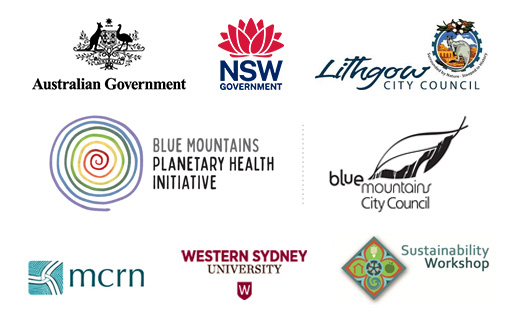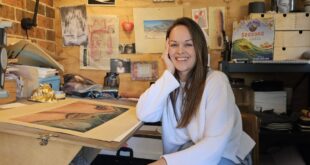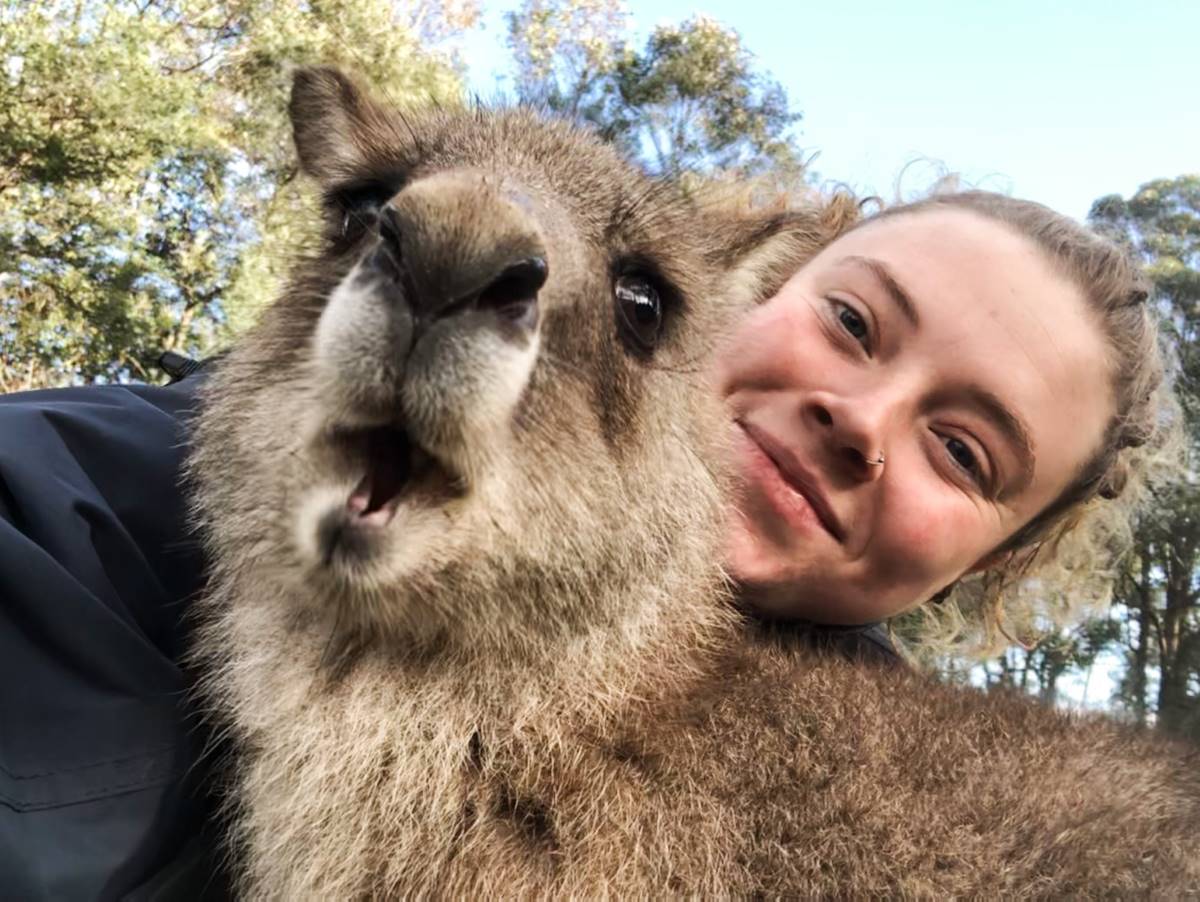
Melinda Kerr with Vinnie the rescue kangaroo (Image supplied)
Story by Hamish Dunlop
Melinda Kerr, Blackheathen Jo Tibbitts and Greg Keightley are all passionate about kangaroos and other macropods. They share their intimate experiences with kangaroos and how they recognise and celebrate their uniqueness.
Key Points:
- Kangaroos are a national icon, but are seen by some as pests and are also harvested for their meat and skins
- Kangaroo researchers and carers, alongside Indigenous leaders, argue for a rethink of how we see kangaroos and their place in the landscape
- New technology is being developed that aims to identify and help sick or injured wombats and kangaroos, then alert the nearest licenced carer.
Melinda Kerr is passionate about kangaroos. For two years she looked after Vinnie until, as she says, “he hopped off into the bush.” Melinda is a licenced wildlife carer. Vinnie, an eastern grey kangaroo, came to her as a joey after his mother was hit by a car. “I love that kangaroo,” Melinda says with longing in her voice. “Looking after him changed my life. It changed my whole perspective on the relationships we can have with wildlife and just how unique and special kangaroos are.”
Melinda had already written a story about wombats and she wanted to tell Vinnie’s story too. “I wanted the whole world to fall in love with him the way I did. If families and communities can connect to Vinnie’s story, the next time they’re driving down a country road, maybe they’ll drive a bit slower”.
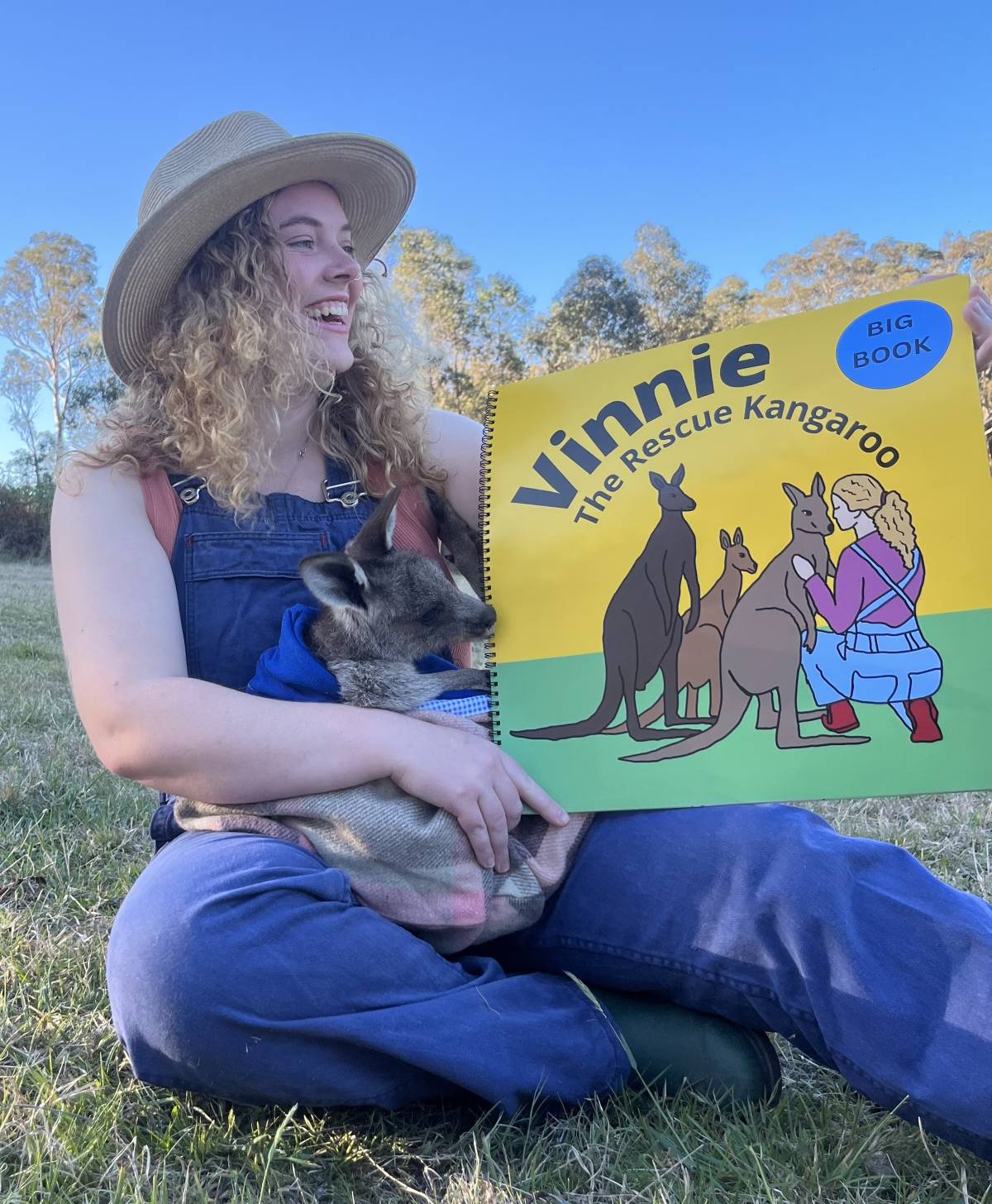
Melinda with her book Vinnie The Rescue Kangaroo (Image supplied)
“This is particularly important around dusk and dawn when kangaroos and other macropods are more active,” Melinda says. The book also aims to provide families with tools to help kangaroos who have been killed or injured in roadside collisions. The first dot point on the roadside rescue page says: When pulling over to check an animal’s pouch, stop in a safe location and use your hazard lights.
The iconic kangaroo
When she’s travelled overseas, Melinda says everyone wants to know about kangaroos. “People are fascinated,” she says. “They see these incredible creatures that are unique to Australia and they want to know what kind of relationship we have with them. They find it difficult to understand that kangaroos are harvested and that many people see them as a pest.”
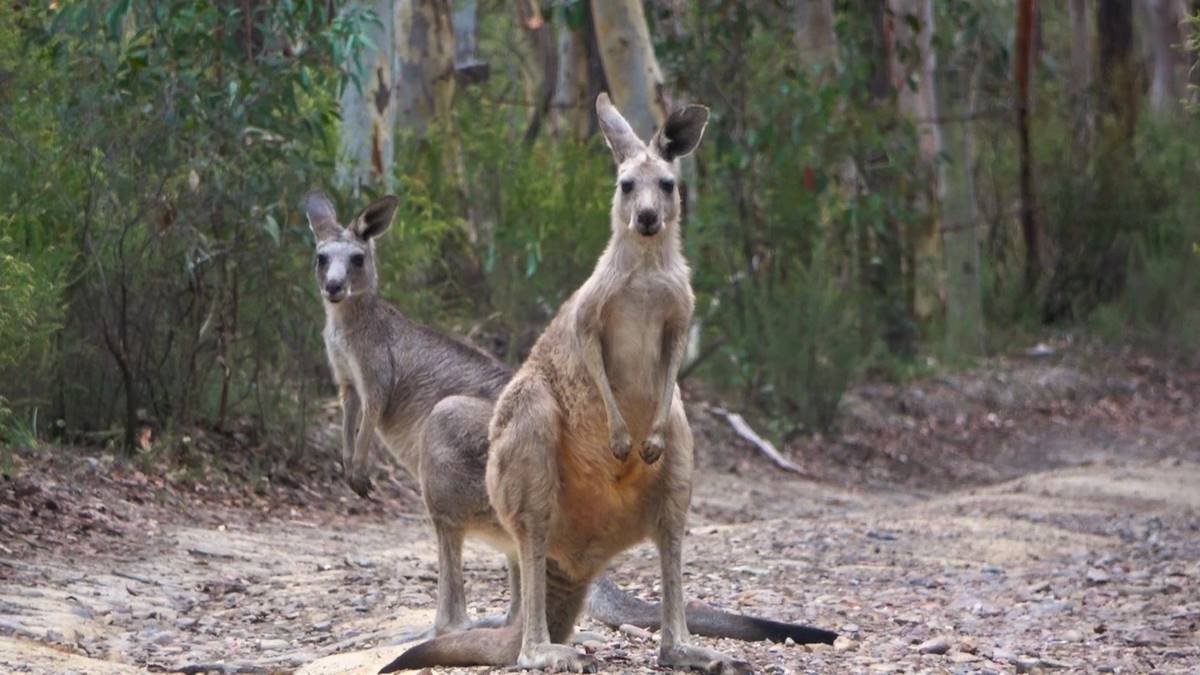
Kangaroos at West Blue Mountains Kangaroo Sanctuary. (Photo: Greg Keightley)
Before she started working in the environment sector, Melinda was an early childhood teacher. She combines this with her love for kangaroos and wombats by going into schools and pre-schools and talking about wildlife. “It’s a really great opportunity to inspire children and sometimes to gently have those tricky conversations about what’s happening in our own backyard.”
Melinda says that some of the issues we face around climate change can be quite heavy; she does think there are important conversations to be had about the reality of what’s happening. However, she’s happy to play such a positive role in helping children and families understand what they can do to help native animals.
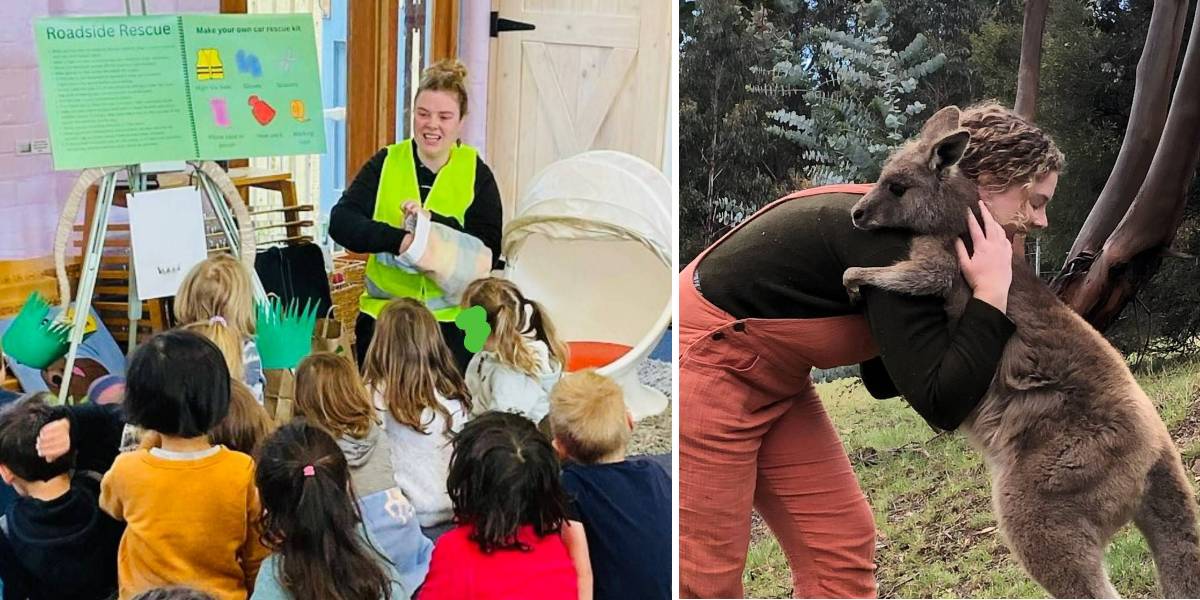
Melinda in the classroom and in the field. (Images supplied)
Part of what she teaches is general awareness of the world and how everything is interconnected. Another element is fostering compassion for all creatures. “Climate change is tough for all of us: humans and other animals,” she says. “Sometimes, events like heatwaves mean that animals come closer to people’s homes than they might otherwise. This might be to seek shelter or to access water. It might be because of habitat loss. Being compassionate is so important. If you find a kangaroo eating or drinking in your backyard, that’s what they need right now.”
A theme of Vinnie The Rescue Kangaroo is slowing down around dusk and dawn. Melinda says it’s always awful when you hit a kangaroo. She hopes what she does helps children to participate in family discussions about what can be done to support native wildlife. Slowing down during high-risk times is one of these things. “It’s like school zones,” she says. “We slow down during those times because we want to look after our children. Shouldn’t we slow down for kangaroos too?”
World Kangaroo Day in the Blue Mountains
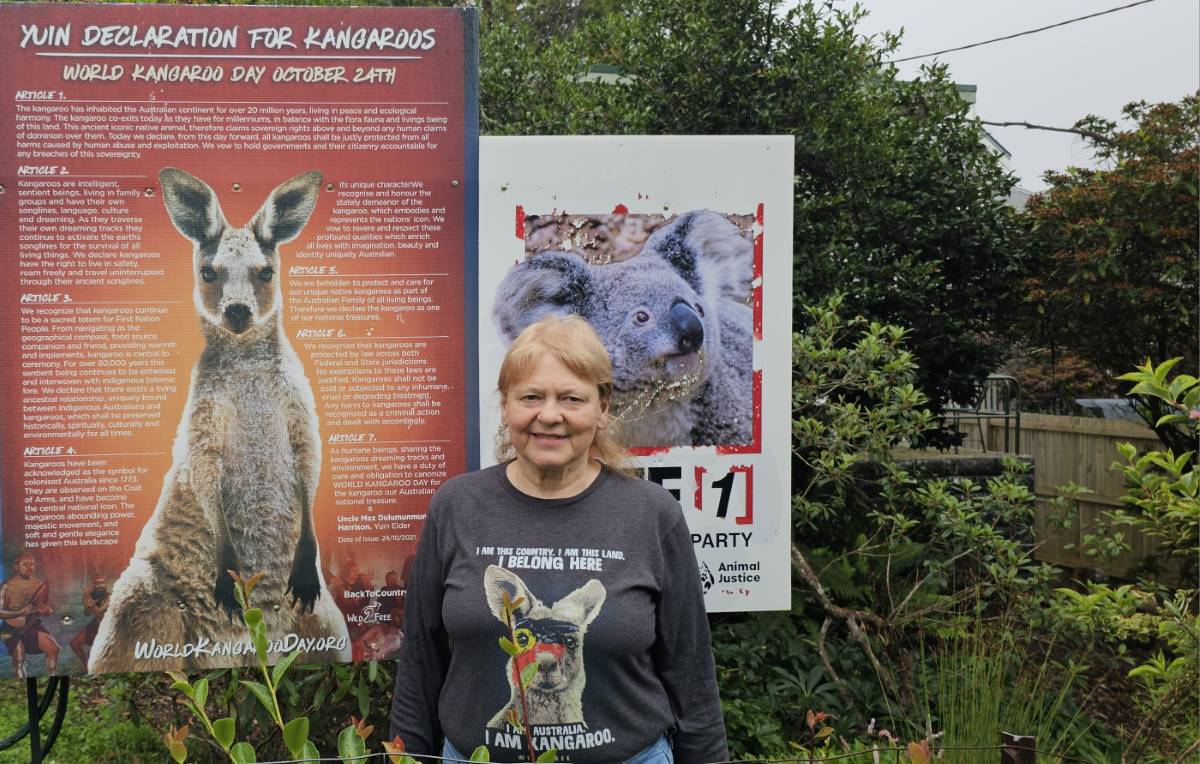
Jo Tibbitts next to the Yuin Declaration For Kangaroos. (Photo: Hamish Dunlop)
Jo Tibbitts is a Blackheathen who is also passionate about kangaroos and wombats. A few years ago, she was inspired by a talk given by licenced wildlife carer Greg Keightley. “They’re just extraordinary creatures” she says. Jo is the founding organiser of Blue Mountains Kangaroo Day. Each year experts, local licenced carers and advocates gather to talk about all things related to kangaroos and wallabies.
Jo says this coming year she wants to do something slightly different. “I’m keen for people to experience the magic of kangaroos, as well as understand the ins- and -outs of kangaroo welfare. Towards this end, she is planning to have an immersive audio-visual component at the 2024 event. “Art has such a wonderful way of bringing people into a connectedness with the world around us.”
Technology helping native animals
Jo has a background in electrical engineering and IT and has started a company called DJT Technology For Wildlife. Her first project is working with Melinda Kerr and Anna Culliton on a project to transform the way wombats and kangaroos are cared for.
The initial project involves developing a system to analyse the massive amount of animal footage recorded by wildlife cameras used to track the health of animals. The software will identify wombats suspected of having mange, a type of skin disease caused by parasitic mites. When a potentially infected individual is identified, the system will alert the appropriate carer about its location. Jo sees the technology as having a broad application including monitoring other wildlife such as kangaroos.
Human and kangaroo coexistence
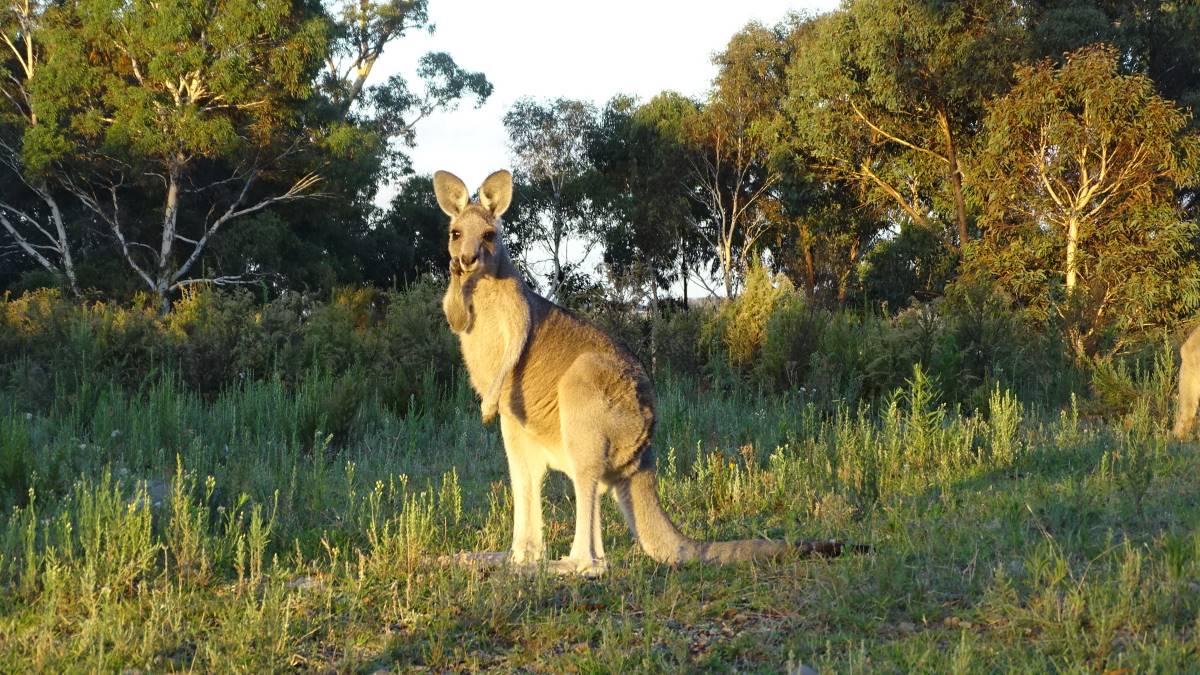
Sunbathing kangaroo. (Photo: Greg Keightley)
Like Melinda, Jo thinks that education and community-level action is critical to furthering kangaroo welfare. For her, the Yuin Declaration, issued by Yuin Elder Uncle Max Dulumunmun Harrison in 2021, is a blueprint for how we should view kangaroos and our relationship with them. One of the central themes of the Declaration is the harmonious physical, cultural and spiritual coexistence of humans and kangaroos.
Greg Keightley, who is a licenced wildlife carer, is focused on how kangaroos and humans can better coexist in rural areas. Greg was chairman of WIRES in the Blue Mountains for many years. Along with his partner Diane he now runs West Blue Mountains Kangaroo Sanctuary. Both Greg and Jo have serious misgivings about the kangaroo harvesting industry and what drives it.
It’s a complex debate with science supporting different and sometimes opposing arguments. What is true is that millions of kangaroos are killed each year for skins and meat. There are arguments about whether we should be killing our national icon at all, but one of the most contentious issues is about the way kangaroos are harvested.
The 2021 inquiry into the Health and wellbeing of kangaroos and other macropods in New South Wales made a range of recommendations including the need for more transparency with respect to the process and practices of the industry. However, the first recommendation was to engage genuinely with Aboriginal peoples and seriously consider their views with respect to the management of kangaroo populations.
For Greg, kangaroos are built to be in the Australian landscape. He points to their evolution on the continent over millions of years. “Their soft feet don’t harden the land; they consume relatively small amounts of water and they nibble grasses selectively. As they move about, they lay pellets that fertilise the ground and spread seed. Sometimes in a dusty landscape, the only new shoots to be seen are ones sprouting amongst kangaroo poo.”
“It’s a different way of looking at them,” he says. “We need to carefully examine the old farming narrative about kangaroo plagues and how they destroy the landscape. It’s ultimately human activity that disrupts the natural order of things. When this happens, other undesired consequences can follow.
Blue Mountains Kangaroos
Greg is keen to emphasis the good work people are doing in the Blue Mountains. “There’s a lot of care and compassion for kangaroos and wallabies up here. I know people in Blackheath and Mount Victoria who are delighted to have them in their gardens. There are also a lot of proactive people who call WIRES or other carers when they think roos need help. There was big fella lying down in someone’s garden the other day. He got a dose of antibiotics and was on his way.”
Kangaroo magic
The one thing that Melinda, Jo and Greg all have in common is an intimate connection with the animals themselves. For all three, the way they are viewed as a resource with economic benefits misses the heart of the matter.
Melinda says that Vinnie treated her like his family. “He’d hop behind me as I went about in the paddock and was always sensitive to social cues. If I was feeling comfortable and happy, he’d be relaxed too. They are social animals,” she says, “just like us. How can we treat them with anything other than care and respect?”
Take Action:
- Slow down at dusk and dawn to reduce the risk of vehicle-kangaroo collisions.
- Learn what to do if you find an injured or killed kangaroo or other macropod.
- Find out about World Kangaroo Day and look out for the Blue Mountains event when details are announced.
Share this article:
This story has been produced as part of a Bioregional Collaboration for Planetary Health and is supported by the Disaster Risk Reduction Fund (DRRF). The DRRF is jointly funded by the Australian and New South Wales governments.
